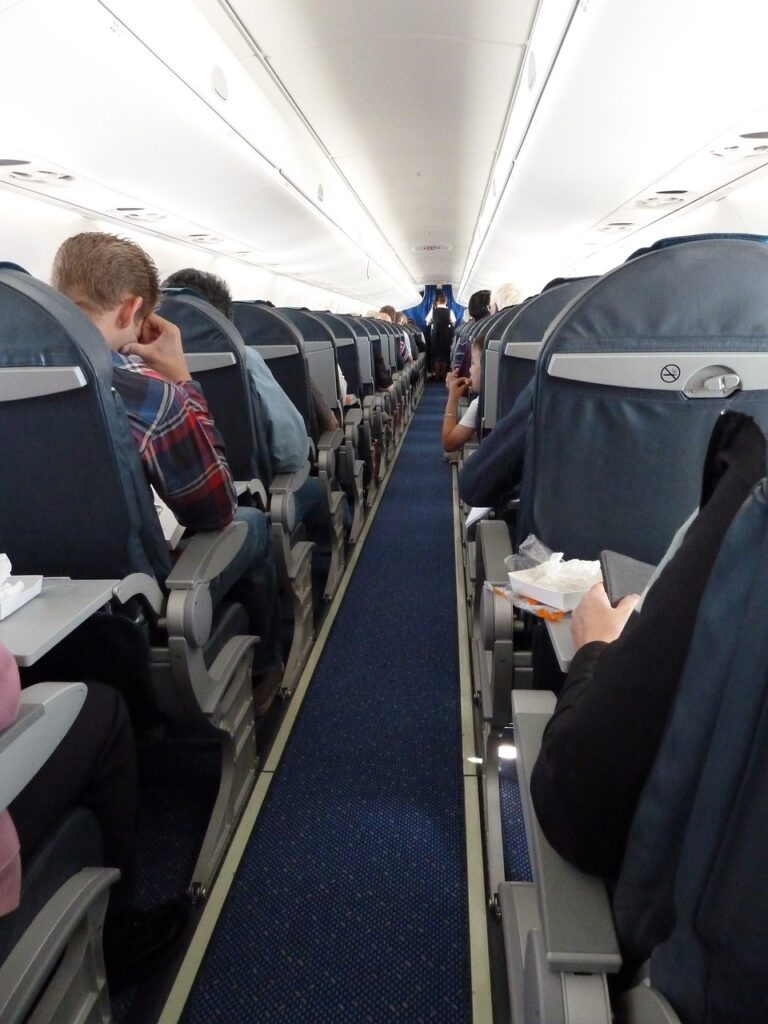Commercial Vs private jets
In this post, we’ll explore the key differences between commercial and private flight attendant jobs.
- From the types of passengers you’ll interact with,
- to the schedules and pay,
we’ll provide a comprehensive comparison to help you make an informed decision. Whether you’re just starting your aviation career or considering a change, this post will give you a better understanding of what it’s like to work as a flight attendant for a commercial airline versus a private jet company.
Commercial Airline Flight Attendant
Working as a flight attendant for a commercial airline is a job that offers a lot of variety and excitement. The commercial airline industry is constantly growing and changing, providing plenty of opportunities for career development and growth. Here are some of the key aspects of the job:
Job Description: As a flight attendant for a commercial airline, your main responsibility is to ensure the safety and comfort of passengers during flights. This includes performing safety demonstrations, serving meals and drinks, assisting with seating arrangements, and responding to any in-flight emergencies.
Work Environment: Flight attendants for commercial airlines typically work on large aircraft with hundreds of passengers. They are part of a team of flight attendants and pilots who work together to ensure a safe and smooth flight experience for passengers.

Schedule: The schedule for flight attendants at commercial airlines can be demanding, with irregular hours and time away from home. They often have to work weekends, holidays, and overnight shifts. However, some airlines offer a more predictable schedule with set hours and days off.
Pay and Benefits: The pay and benefits offered by commercial airlines vary depending on the company, but many offer competitive salaries, health insurance, and retirement plans. Some airlines also offer additional benefits such as discounted travel and education assistance.
Career Growth Opportunities: The commercial airline industry is constantly growing, providing many opportunities for flight attendants to advance their careers. With experience, flight attendants can move into supervisory roles or pursue training in other areas such as training, dispatch, or management.
Working as a flight attendant for a commercial airline is a challenging but rewarding job that offers a unique opportunity to see the world and help others while doing so.
Job Description
As a flight attendant for a commercial airline, your main responsibility is to ensure the safety and comfort of passengers during flights. This includes performing safety demonstrations, serving meals and drinks, assisting with seating arrangements, and responding to any in-flight emergencies.
Work Environment
Flight attendants for commercial airlines typically work on large aircraft with hundreds of passengers. They are part of a team of flight attendants and pilots who work together to ensure a safe and smooth flight experience for passengers.
Schedule
The schedule for flight attendants at commercial airlines can be demanding, with irregular hours and time away from home. They often have to work weekends, holidays, and overnight shifts. However, some airlines offer a more predictable schedule with set hours and days off.
Pay and Benefits
The pay and benefits offered by commercial airlines vary depending on the company, but many offer competitive salaries, health insurance, and retirement plans. Some airlines also offer additional benefits such as discounted travel and education assistance.
Career Growth Opportunities
The commercial airline industry is constantly growing, providing many opportunities for flight attendants to advance their careers. With experience, flight attendants can move into supervisory roles or pursue training in other areas such as training, dispatch, or management.
Working as a flight attendant for a commercial airline is a challenging but rewarding job that offers a unique opportunity to see the world and help others while doing so.

Private Jet Flight Attendant
Working as a flight attendant on private jets is a different experience compared to working for a commercial airline. Private jets offer a more personalized and intimate setting for flight attendants to interact with passengers. Private jet company’s also require several years experience as a flight attendant before the applicant is even considered.

Working as a flight attendant on private jets is a different experience compared to working for a commercial airline. Private jets offer a more personalized and intimate setting for flight attendants to interact with passengers. Here are some of the key aspects of the job:
Job Description: As a flight attendant on private jets, your responsibilities are similar to those of a commercial airline flight attendant, but on a smaller scale. You will still need to ensure the safety and comfort of passengers, serve meals and drinks, and respond to any in-flight emergencies. However, because private jets cater to a more exclusive group of passengers, you may also be responsible for additional tasks such as preparing the cabin and assisting with luggage.
Work Environment: Private jets are smaller and less crowded compared to commercial airlines, providing a more intimate and relaxed environment for both passengers and flight attendants.
Schedule: The schedule for flight attendants on private jets can be more flexible compared to commercial airlines, but it also depends on the specific company. Some private jet companies require flight attendants to be on-call and available for flights at a moment’s notice, while others have a more predictable schedule with set hours and days off.
Pay and Benefits: Private jet companies typically offer higher pay and better benefits compared to commercial airlines. This can include health insurance, retirement plans, and additional perks such as free or discounted travel.
Career Growth Opportunities: Opportunities for career growth as a flight attendant on private jets may be more limited compared to commercial airlines. However, the experience gained on private jets can be valuable and can open up opportunities in other areas of the aviation industry.
Working as a flight attendant on private jets is a unique opportunity to provide a more personalized and exclusive experience for passengers. The intimate setting and flexible schedule can be appealing to some, but it’s important to weigh the trade-offs before making a decision



Job Description
As a flight attendant on private jets, your responsibilities are similar to those of a commercial airline flight attendant, but on a smaller scale. You will still need to ensure the safety and comfort of passengers, serve meals and drinks, and respond to any in-flight emergencies.
Passengers will expect more
Because private jets cater to a more exclusive group of passengers, you may also be responsible for additional tasks such as preparing the cabin, assisting with luggage and satisfying anything the passenger requests.
Work Environment
Private jets are smaller and less crowded compared to commercial airlines, providing a more intimate and relaxed environment for both passengers and flight attendants.
Schedule
The schedule for flight attendants on private jets can be more flexible compared to commercial airlines, but it also depends on the specific company. Some private jet companies require flight attendants to be on-call and available for flights at a moment’s notice, while others have a more predictable schedule with set hours and days off.
Pay and Benefits
Private jet companies typically offer higher pay and better benefits compared to commercial airlines. This can include health insurance, retirement plans, and additional perks such as free or discounted travel.
Career Growth Opportunities
Opportunities for career growth as a flight attendant on private jets may be more limited compared to commercial airlines. However, the experience gained on private jets can be valuable and can open up opportunities in other areas of the aviation industry.
Working as a flight attendant on private jets is a unique opportunity to provide a more personalized and exclusive experience for passengers. The intimate setting and flexible schedule can be appealing to some, but it’s important to weigh the trade-offs before making a decision
Comparison
Commercial
Hiring: Some airlines will hire applicants straight out of high school, then they will pay to train them and garentee the applicant a job after completion of the tranning course.
Private
Hiring: Private airlines require that the applicant has several years of experience as a flight attendant before they are considered, so there is no training.
Commercial
Passengers: Flight attendants for commercial airlines interact with a large and diverse group of passengers.
Private
Passengers: Private jet flight attendants typically serve a smaller number, more exclusive and affluent clientele.
Commercial
Flight Operations: Commercial airlines operate on a larger scale and have more standard procedures. When you go into work, you’ll know what you’ll be doing and when.
Private
Flight Operations: Private jets offer a more customized and personal experience. You will never know before hand what passengers will request.
Commercial
Schedule Flexibility: Flight attendants working for commercial airlines, the schedule can be demanding and require irregular hours and time away from home.
Private
Schedule Flexibility: The schedule for flight attendants on private jets can be more flexible, but it depends on the specific company.
Commercial
Pay and Benefits: When you’re first hired as a commercial flight attendant, your schedule will be unpredictable and you will be on call. But as you get experience, you will be able to choose when you want to work and where you’ll fly to.
Private
Pay and Benefits: Private jet companies typically offer higher pay and better benefits compared to commercial airlines. However, it’s important to consider the trade-offs, such as being on call and having a less predictable schedule.
Commercial
Career Growth Opportunities: Commercial flight attendants have much more opportunity to grow in their career. They can get into management, recruit new hires, teach new hires, just to name a few opportunities!
Private
Career Growth Opportunities: While opportunities for career growth may be more limited compared to commercial airlines, the experience gained can be valuable and can open up opportunities in other areas of the aviation industry.
The decision between working as a flight attendant for a commercial airline or private jets depends on personal priorities and goals. Both careers offer unique opportunities and challenges, and it’s important to weigh the pros and cons before making a decision.